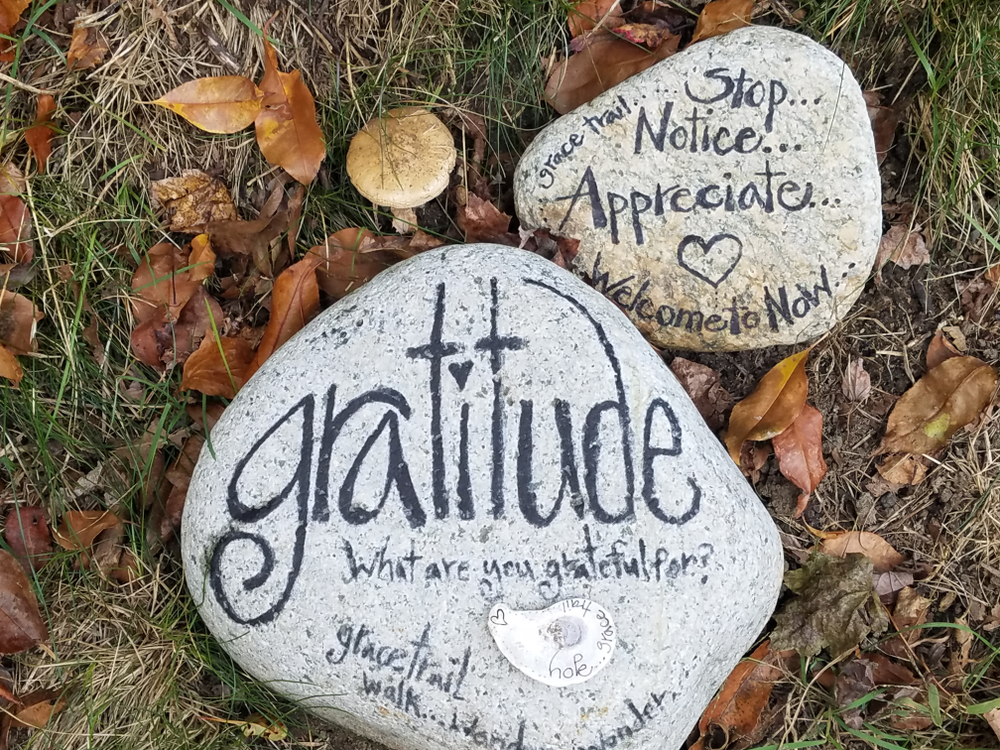
18 May Practicing Gratitude During Difficult Times
During these unprecedented times, it is easy to fall victim to the negative events happening around us. People are getting ill, stores are closing, people are losing their jobs, and we have to stay home instead of visiting friends and family. These are tough times and there is a lot to complain about. However, there are many things to be grateful for, too. The benefits of gratitude can make these times a little more bearable.
It is important to understand what gratitude is. According to the dictionary, gratitude is “the quality of being thankful; readiness to show appreciation for and to return kindness.” Gratitude is a state of mind. It is a choice to have and to practice gratitude. Gratitude does not come with a feeling of anxiousness about having to pay it back or feeling you are undeserving.
Benefits of Gratitude
The brain.
There has been a lot of research on gratitude and how it affects the brain. MRIs have been able to show how gratitude affects the brain. We now know that gratitude has an effect on the hypothalamus and the other parts of the reward center of the brain. It releases Dopamine and Serotonin, which are feel-good neurotransmitters. When we participate in an event that releases feel-good transmitters, we want to do it again to get that same pleasurable experience. It will soon become a habit to think of the positive things in your life.
Our thoughts.
Okay, so we all don’t have an interest in brain anatomy and neurotransmitters. Let’s look at the benefits that we can see in our daily life. We know that our thoughts have an effect on our feelings and behaviors. If we are thinking about the negative things that are happening around us, we will oftentimes feel bad. If we can alter our thinking by reframing the situation, we can alter the way we feel. Having gratitude can do just that. Gratitude can alter how we think about the negative situations. Remember, there is always more than one way to see a situation. Even the small things in life can be sources of gratitude. I was grateful today because the sun was shining after days of rain.
Our behaviors.
Having gratitude can also affect how we behave. If our thoughts allow us to feel better, then feeling better might allow us to engage in positive activities easier. If I wake up glad to see the sun, I may go for a walk instead of staying inside. Going for a walk will increase my activity and exercise for the day. More activity and exercise will allow me to increase my energy. Exercise and activity might help me eat healthy that day, which all helps my overall mood and outlook on life. Gratitude can help decrease the risk of depression and anxiety.
Stress.
Gratitude can help reduce your overall stress. Stress comes from thinking that there is a threat, whether imagined or real. If we can reframe our situation and lower the threat level, this will help lower our stress. With this reduction in stress, it will allow us to sleep better at night, be more relaxed during the day, and increase our immune system.
Relationships.
Gratitude can also help increase the quality of your relationships. For example, if your partner leaves a mess in the kitchen after cooking. You walk into the kitchen after a long day of work. Your automatic thought is, “Why can’t he pick up after himself?” Instead of reacting to this automatic negative thought, look at the situation through a gratitude lens. Instead tell yourself, that you are glad that he is capable of cooking, loving you, sharing shelter with you, and having food to cook. It doesn’t take the mess away, but it makes it a little more manageable and the anger is not so intense.
Gratitude makes it easier to look at your partner with compassion and empathy. Maybe he had a long day too and will get back to the mess at a different time. If we don’t stop to reframe with a grateful lens, we may miss the opportunity to have compassion.
We are all intertwined.
Gratitude is not thinking that the world owes you something. It is not saying “this isn’t fair.” We need to see that we all rely on one another. From the day we were born, we relied on others. We are not in this world alone. We rely on other people to: tend to our illness, or broken bones; grow and manufacture our food; tend to our social needs. Also, we need love from family, partners, and friends. Life is give and receive. Robert Emmons the world’s leading scientific expert on gratitude from the GGSC’s Gratitude project writes, “Seeing with grateful eyes requires that we see the web of interconnection in which we alternate between being givers and receivers. The humble person says that life is a gift to be grateful for, not a right to be claimed.”
But how do we feel grateful amidst this pandemic? We have to remember that being grateful is a choice and something we need to practice. We might not have control over what is happening, but we can choose how we react to it. It might not always be easy. Looking at a crisis in a different way can help a person deepen what they are grateful for. We become more thankful for what we have when it is lost. Even imaging what can be lost (jobs, relationships, family) will help deepen your gratitude and not take these gifts for granted.
Implementing Gratitude
Slow down.
Take the time to smell the roses or look at the sunset. This is a skill that comes from being mindful. Being mindful and actively engage your senses will help you take in the experience fully. Really see the sunset, smell the coffee, savor the bite of chocolate, feel the warmth of the sun, hear the birds chirping, and tasting the sweetness of a freshly picked strawberry. Like mindfulness, gratitude takes time and consistency. Be patient.
Thank someone and be specific.
Gratitude thrives on specificity. Instead of just saying. “I love you for being wonderful,” say “I love you for bringing me coffee in bed.” When we do something or let someone know that we are grateful for them, this produces the feel-good chemicals in our brain. Showing gratitude to someone will also strengthen that relationship.
Reach out to someone.
Write a letter, call, or send a note to someone. It is nice to get items in the mail and doing selfless acts will help deepen the ability to stay positive.
Keep a gratitude journal.
Write 3-5 things every day that you are thankful for. It can be small or big things. Write different things each day. With consistency and time, it will be easier to see the positive sides of situations and turn the lemons into lemonade.
Watch your words.
Words can have a dramatic influence on how you feel. If you can change your “have tos” to “get tos” it will trick your brain into thinking you are doing something pleasant instead of another chore.
Being grateful for the positive things can be easy. It takes more effort to look at difficult situations through a grateful lens. Everything won’t turn into rainbows and unicorns and all of your problems are not going to disappear, but this one small practice that you can do each day will have a ripple effect to increase your overall well-being. If we practice these strategies it will become second nature and you will be less stressed. You will be able to see the opportunity hardships can bring.
During the COVID-19 pandemic, it is easy to see the negative consequences of shutting down places. However, if we can take a moment to be grateful for what we do have and who we are with, we can be a little less negative. If you would like guidance and support on your journey, reach out to North Shore Family Services.

Lisa is a Licensed Clinical Social Worker who earned her master’s degree from The Ohio State University. She grew up in Libertyville and is thrilled to return to her hometown after 15 years of clinical experience in a variety of settings, including home-based case management, schools, outpatient mental health, and hospitals.
Lisa has provided treatment in clinical settings for children, teens, adults, and families who struggle with depression, anxiety, mood disorders, trauma, stress, gender identity issues, self-esteem issues, impulsivity, defiance, and attention deficits. Lisa has worked in the schools implementing programs and services to individual students and groups to enhance coping skills and academic performance and has worked in crisis teams assessing for suicidality as well as crisis management. She uses CBT, DBT, Solution-focused therapy, play therapy (for younger clients) and EMDR to help her clients and their families reach their goals. Lisa is also trained to work with and assess adolescents for substance use, if this is a concern. She provides a non-judgmental, client-centered environment assisting clients to reach their personal goals of therapy. She believes in utilizing a team effort to help families become empowered and work through stressful times.



Sorry, the comment form is closed at this time.